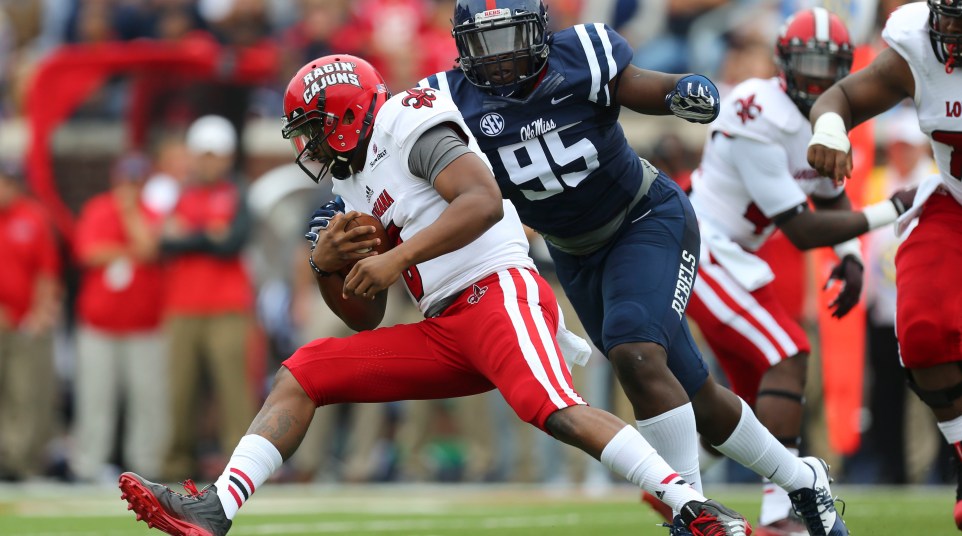Matchup breakdown: Ole Miss front seven vs. Memphis rushing attack
In preparation for Saturday’s regional rivalry game between Ole Miss and Memphis, Saturday Down South is taking a look at a key matchup that may decide the showdown between the Rebels and the Tigers.
Ole Miss front seven vs. Memphis’ rushing attack
The Memphis Tigers love to run the ball, and with not one, but two standout tailbacks, it is easy to see why.
The Tigers’ tandem of Doroland Dorceus and Brandon Hayes has shined in Memphis’ first three games, leading Memphis to the No. 26 rushing attack in the nation. Both Dorceus and Hayes have averaged better than 4.5 yards per carry on the season, splitting the workload close to evenly in the Tigers’ backfield (Hayes has carried the ball 41 times this season to Dorceus’ 38).
The two backs have combined to rush for 410 yards and five touchdowns in three games, an average of more than 136 yards per game. Dorceus and Hayes combined to rush for 120 yards and a touchdown in Memphis’ near-upset of then-No. 11 UCLA three weeks ago, as the Tigers maintained a balanced attack on offense to post 35 points on UCLA’s defense.
Memphis will try and get its running game going early against a stout Ole Miss defense ranked No. 3 in the nation in scoring defense but No. 63 in rush defense. If the Rebels are to stave off a Tigers’ upset bid the way UCLA did earlier this month, they’ll have to eliminate the threat of the run and force the ball into the hands of Memphis quarterback Paxton Lynch, who has led the Tigers’ middle-of-the-pack aerial attack this season.
The Rebels’ secondary has been unkind to opposing offenses in 2014, led by cornerback Senquez Golson, who is among the top defensive backs in the SEC. The front seven has been stout as well, and will need to contain Hayes and Dorceus to allow Ole Miss’ secondary to play more aggressively in the back-end of the defense.
The Tigers’ backs have power when running inside and speed to break a big play on the perimeter, making it critical Ole Miss’ front seven remain fundamentally sound on every snap. Linebackers Serderius Bryant, Deterrian Shackelford and Denzel Nkemdiche have the athleticism to cover sideline-to-sideline, but they cannot over-pursue a runner or risk being burned by the multiple-dimensions of the Memphis rushing attack.
Likewise, the Rebels’ defensive line must win the battle in the trenches on Saturday. The easiest way to stop the run is to out-perform the blocking set up on a given play, which is what the defensive line must do to allow Ole Miss’ linebackers to make plays. If the Rebels dictate where a run play is headed rather than the offense, it becomes that much easier for linebackers like Bryant and Shackelford to make plays.
Even safety Cody Prewitt is a sure tackler with good instincts in the run game. If needed, he can always drop down into the box and assist the front seven in obvious rushing situations, and the rest of the Ole Miss secondary is still good enough to compensate if Prewitt is caught inside on what turns out to be a pass play.
With two top-flight backs, the Tigers should have a fresh runner on the field for most of the game. Thus, Ole Miss cannot afford to allow the Memphis rushing attack to execute long, extended drives, wearing out the Rebels’ defense in the process.
If Ole Miss is able to take an early lead, it could force Memphis to throw the ball more than it’d like in the second half to keep up on the scoreboard. But in a close game, the Rebels must force Lynch to beat them, not Dorceus or Hayes.

